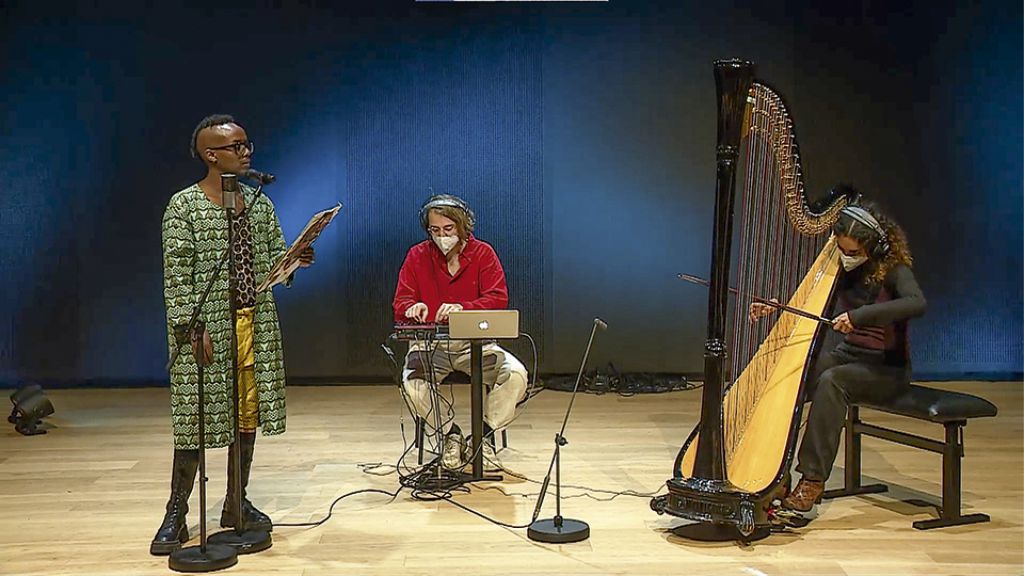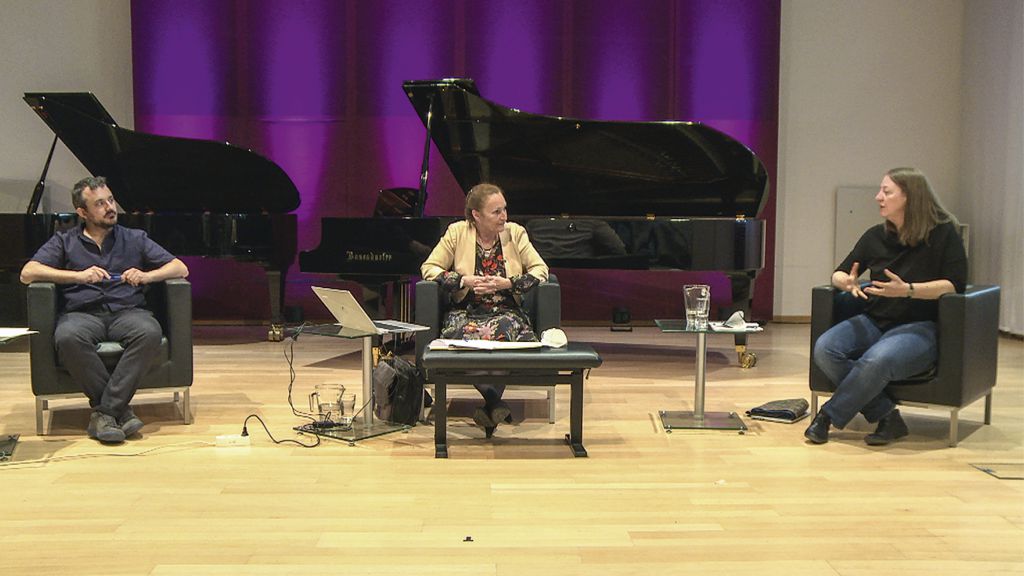Symposium Transkulturalität_mdw 2021
Contesting Border Regimes – Sounds and Images was the title of 2021’s international symposium Transkulturalität_mdw, which took place online on 7 and 8 May. In keeping with this event’s seven-year commitment, which has seen interdisciplinary scientific and artistic contributions around the notions of culture, cultural boundaries, and their theoretical and practical intersection in education and in the wider social and political realm, the focus this time was on recent refugee movements and the socio-political and cultural realities—and inequalities—that have emerged as result. Over 100 participants from all over the world—including both contributors and the audience—came together using digital meeting software, which has grown ever more integrated into everyday educational realities due to covid-19 restrictions and played a central role in rendering this type of event more international. The programme here included a variety of inputs such as keynote lectures, music, poetry, performances, film projections, panel discussions, and paper presentations. And with the aspiration of bringing diverse forms of artistic expression, fields of scholarship, and activism into dialog, it also extended invitations to personalities from within and outside the academic world.

The event was opened by Vice Rector for Organisational Development, Gender & Diversity Gerda Müller. She underscored that in striving towards a more diverse and fair university, the mdw – University of Music and Performing Arts is ever keen to promote critical thinking among its students in addition to academic expertise. The symposium Transkulturalität_mdw 2021 represents a step towards fulfilling this constant goal. Müller’s address was followed by words from Ursula Hemetek, Director of the Department of Folk Music Research and Ethnomusicology as well as of the Music and Minorities Research Center, who introduced the theme of Transkulturalität_mdw 2021 and the notion of crossing borders in relation to cultural diversity and inequality, also referring to the role played by this event in opening up space for reflection and influence within and beyond mdw.
This opening presentation then saw Tonica Hunter, curator of the artistic and musical contributions to the symposium, explain the idea of intentionally interlacing such performances between the various lectures, presentations, and discussions, thereby allowing music to become part of the discourse. Entitled Metamorphosis//Metahuman and reflecting the diverse body and identities of the main performer, Faris Cuchi Gezahegn (they/them), this contribution aimed to use music, sound, song, poetry, image, and collage to deconstruct and reconstruct body experiences and selves that challenge white supremacy and oppression. Other participants in this artistic-musical project were Miriam Adefris (harp), Dora Deliyska (piano), Ganaël Dumreicher (electronics), and Ciara Moser (bass guitar).
The first keynote presenter Brigitta Kuster, whose background lies in visual and film studies, cultural studies, and migration and border studies, discussed the emergent trend among young migrants from the Maghreb, self-identified as harraga, of uploading to YouTube videos recorded while crossing the Mediterranean towards European shores in makeshift motorboats. She theorised these audio-visual witnesses to transnational migration by employing post-cinematic approaches—Affectics—that bypass narrative structures and make use of assemblage techniques that, while stemming from the materiality of the actual conditions during the sea passage, further generate new possibilities and affective connections between politics and aesthetics.
The first day closed with the online projection of the film Purple Sea (67’, 2020) directed by Amel Alzakout and Khaled Abdulwahed. The film consists of images and sounds accidentally filmed by Amel Alzakout on 28 October 2015 while waiting to be rescued among other refugees whose boat sank trying to reach the Greek island of Lesbos. Aiming to create a safe space for communicating this terrible experience that cost the lives of 42 people, the footage was further edited into a film covered by Alzakout’s voice. She narrated the story from the intimate space of her own life experience, memories, and imagination in the form of an interactive dialog with the raw images. The projection was followed by a panel discussion with the two directors and the editor, Philip Scheffner, that was chaired by Evelyn Annuß.
On the symposium’s second day, political scientist Ilker Ataç examined the notion of “urban citizenship,” placing his focus on emerging local inclusionary politics in the field of migration in various European cities. These politics, by engaging institutional actors such as municipalities as well as civil society and grassroots initiatives, manifest new political visions that contrast with the mainstream of strict migration and border policies developed at the pan-European and nation-state levels.

The symposium closed with three paper contributions and a hybrid-form panel discussion involving ethnomusicologists Anja Brunner, Ioannis Christidis, and Evrim Hikmet Öğüt. Their papers discussed musical practices of Syrian migrants and refugees in relation to ideological, political, spatial, and musical boundaries. Brunner focused on women musicians from Syria in Austria and Germany, on their experiences in exile, and on the music and life strategies they have developed to correspond to their new social realities. In the lives of these musicians, crossing borders has involved both physical and symbolic boundaries, implying further musical negotiations with imagined or real cultural and musical differences. Christidis examined the way in which certain mainstream political discourses around the idea of a “common Europeanity,” built upon intensive processes of cultural, political, and physical exclusion of non-European “Others,” were challenged, negotiated, or adapted in musical strategies by Syrian refugee and migrant minorities in two different but related contexts: in Thessaloniki, Greece in 2015 (during the refugee journey), and in Vienna, Austria (one of the Syrian refugees’ main destinations) in 2019–2020. Öğüt discussed the street music practices of Syrian musicians in Taksim Square and Istiklal Street in Istanbul, Turkey in the context of “social non-movements.“ Faced with ineffective migration policies in Turkey and limited access to performance venues, these musicians claimed their existence in the city by developing their own musical, spatial, and social strategies. The presentations were followed by a lively discussion chaired by Ursula Hemetek.
This symposium was organised by a team consisting of Evelyn Annuß, Julia Fent, Ursula Hemetek, Therese Kaufmann, Gerda Müller, and Hande Sağlam. The mdw’s AV Centre, coordinated by Pit Kaufmann, undertook the digital support and audio-visual recording. The feedback of the international attendees, especially regarding the format (which integrated musical compositions, performances, and academic discussions and adhered to high technical and aesthetic standards), was very positive.
Part of the symposium can now be accessed via the mdwMediathek at: mediathek.mdw.ac.at/contestingborderregimes
For more details about the symposium’s programme, visit:
mdw.ac.at/ive/symposium-2021
Further information on the artistic contribution Metamorphosis//Metahuman and the film Purple Sea can be found at the following link: tonicahunter.com/work
